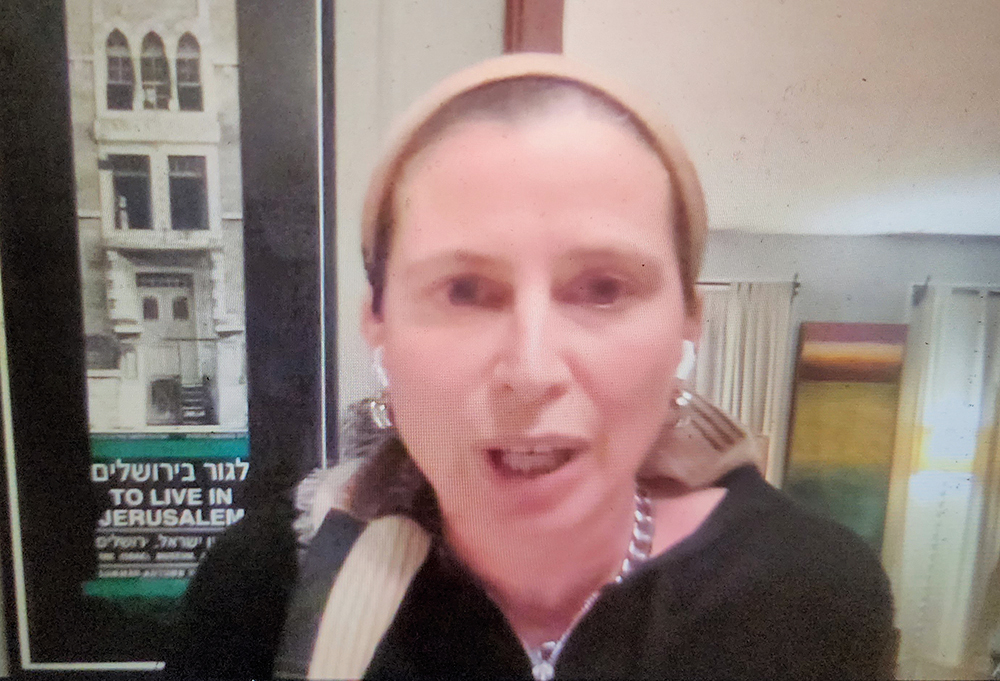
Several dozen people joined on Zoom last Saturday night to hear Dr. Tammy Jacobowitz speak on the topic of “Raising Religious Expectations: Parents, Kids, and Mindful Torah Study,” presented by the Orthodox Jewish Forum of Edison/Highland Park. Initial technical difficulties were quickly overcome and the audience welcomed the opportunity to hear new approaches to learning Torah and ways to internalize learning and make it more meaningful. Jacobowitz is Tanakh department chair at SAR High School; founding director of Makom B’Siach, an immersive adult education program for parents at SAR; and an adjunct faculty member of Yeshivat Chovevei Torah.
Jacobowitz began her presentation with a definition of what “raising religious expectations” means. Children should look to the Torah as a means with which to learn about themselves and the world around them while not taking the rituals and religious observances for granted. She also described the book project that she is working on with Sefaria, which is an outgrowth of her PhD dissertation on Midrash that she completed at the University of Pennsylvania.
People continue to actively pursue Torah study because of the inspiration, guidance and challenges found within its pages. The question becomes how to overcome the obstacles to making Torah study relevant and interesting, and encourage children to approach the learning with enthusiasm. There is the need to balance the many values that come from the core of the Torah while encouraging creative and critical thinking that will help children internalize the values and deepen their connection to their faith.
While the study of Torah and the many commentaries is valuable it does not help the learner internalize the material, develop their own opinions, and appreciate the religion. There is a need to move beyond the mere accumulation of the knowledge learned and create an environment where the learner is not just learning from the Bible or about the Bible. The new paradigm includes the internalization of the learning and the personal application of the knowledge to make the material relevant in the present day. Jacobowitz acknowledged that there is some risk to allowing students to think on their own and create their own meanings. “If there is no risk, there is no gain.” Without the opportunity to internalize the material and add personal interpretation there is a risk that students may stop learning entirely.
Jacobowitz began her book as a new way to approach Torah learning with and for children. She considers books that are currently available problematic for several reasons and hopes her new material will change things. Books on the market today include illustrations that depict only boys—and those pictures are of boys who do not look like ones in the Modern Orthodox community. Another concern is that Midrash and actual Torah verse are merged together so it is difficult to determine where the boundaries between commentary and scripture are. A third issue is that the material lacks the opportunity to have a discussion, ask an opinion, and add the engagement that is necessary for children to become active learners.
The parent plays a critical role in the learning experience by presenting the child with the opportunity to start conversations that enhance the learning.
Jacobowitz presented the example of the Parsha Tazria where there is a discussion of the sacrifice that a woman must bring after giving birth. In addition to a potential discussion as to why there is a difference if the baby was a girl or boy, there is another area to explore covering a less-expensive option if the new mother cannot afford the sacrifice listed. There are so many topics that can be conversation starters to show timely Torah relevance. Then, as now, the presence of a new baby disrupts a home’s status quo and it takes time for things to settle into a new routine. How does the child see this in his/her life? It is nice that a new mother’s first outing in public includes a ceremony with a religious note. How does the cheaper alternative relate to today’s economic climate and religious obligation? How can children be sensitive in a community that includes people from a broad socioeconomic spectrum? Questions such as these are not all-inclusive, but are meant to be conversation starters that can continue throughout the years at various age and education levels.
An active Q&A component included questions about addressing ritual sacrifices with children who are vegetarian, incorporating adult/parent educational components in the day school environment, and educational changes and impacts following October 7.
The Orthodox Forum is a grassroots organization that relies on community donations to fund programs that discuss contemporary issues and ideas of interest. For more information visit: https://orthodoxjewishforum.dreamhosters.com/hpedison/
Deborah Melman is a staff writer at The Jewish Link.












